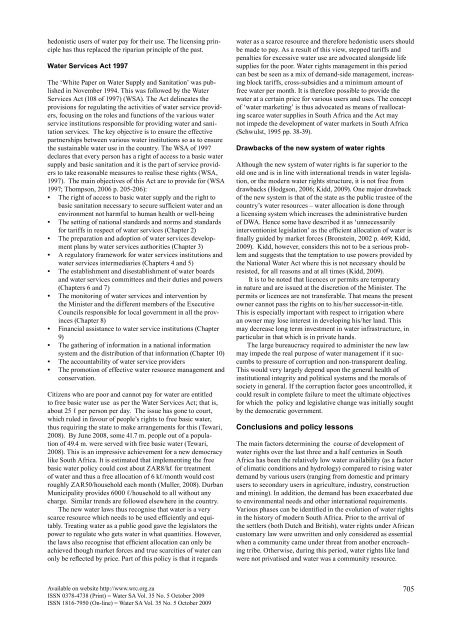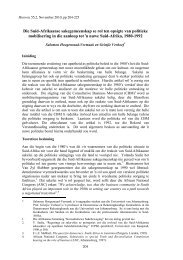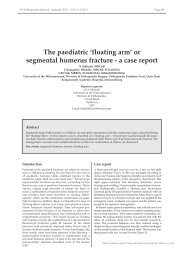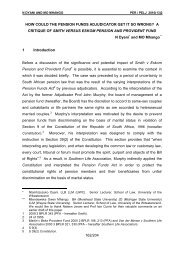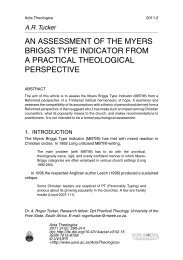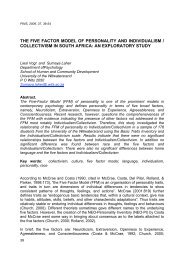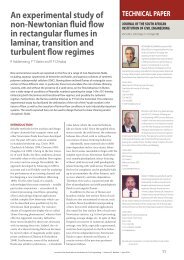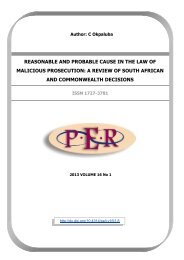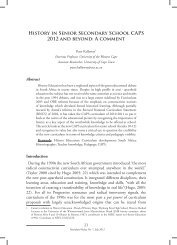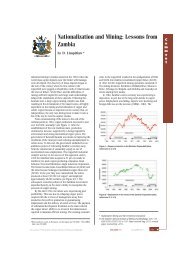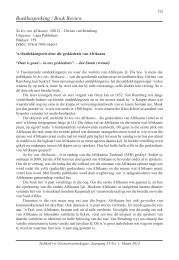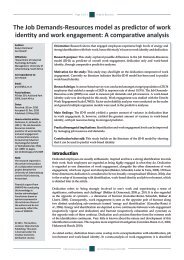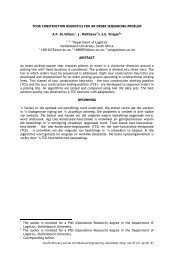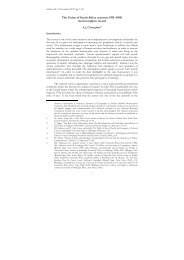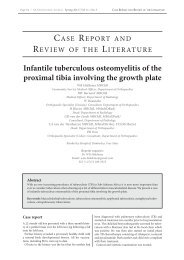A detailed analysis of evolution of water rights in South Africa: An ...
A detailed analysis of evolution of water rights in South Africa: An ...
A detailed analysis of evolution of water rights in South Africa: An ...
Create successful ePaper yourself
Turn your PDF publications into a flip-book with our unique Google optimized e-Paper software.
hedonistic users <strong>of</strong> <strong>water</strong> pay for their use. The licens<strong>in</strong>g pr<strong>in</strong>ciple<br />
has thus replaced the riparian pr<strong>in</strong>ciple <strong>of</strong> the past.<br />
Water Services Act 1997<br />
The ‘White Paper on Water Supply and Sanitation’ was published<br />
<strong>in</strong> November 1994. This was followed by the Water<br />
Services Act (108 <strong>of</strong> 1997) (WSA). The Act del<strong>in</strong>eates the<br />
provisions for regulat<strong>in</strong>g the activities <strong>of</strong> <strong>water</strong> service providers,<br />
focus<strong>in</strong>g on the roles and functions <strong>of</strong> the various <strong>water</strong><br />
service <strong>in</strong>stitutions responsible for provid<strong>in</strong>g <strong>water</strong> and sanitation<br />
services. The key objective is to ensure the effective<br />
partnerships between various <strong>water</strong> <strong>in</strong>stitutions so as to ensure<br />
the susta<strong>in</strong>able <strong>water</strong> use <strong>in</strong> the country. The WSA <strong>of</strong> 1997<br />
declares that every person has a right <strong>of</strong> access to a basic <strong>water</strong><br />
supply and basic sanitation and it is the part <strong>of</strong> service providers<br />
to take reasonable measures to realise these <strong>rights</strong> (WSA,<br />
1997). The ma<strong>in</strong> objectives <strong>of</strong> this Act are to provide for (WSA<br />
1997; Thompson, 2006 p. 205-206):<br />
• The right <strong>of</strong> access to basic <strong>water</strong> supply and the right to<br />
basic sanitation necessary to secure sufficient <strong>water</strong> and an<br />
environment not harmful to human health or well-be<strong>in</strong>g<br />
• The sett<strong>in</strong>g <strong>of</strong> national standards and norms and standards<br />
for tariffs <strong>in</strong> respect <strong>of</strong> <strong>water</strong> services (Chapter 2)<br />
• The preparation and adoption <strong>of</strong> <strong>water</strong> services development<br />
plans by <strong>water</strong> services authorities (Chapter 3)<br />
• A regulatory framework for <strong>water</strong> services <strong>in</strong>stitutions and<br />
<strong>water</strong> services <strong>in</strong>termediaries (Chapters 4 and 5)<br />
• The establishment and disestablishment <strong>of</strong> <strong>water</strong> boards<br />
and <strong>water</strong> services committees and their duties and powers<br />
(Chapters 6 and 7)<br />
• The monitor<strong>in</strong>g <strong>of</strong> <strong>water</strong> services and <strong>in</strong>tervention by<br />
the M<strong>in</strong>ister and the different members <strong>of</strong> the Executive<br />
Councils responsible for local government <strong>in</strong> all the prov<strong>in</strong>ces<br />
(Chapter 8)<br />
• F<strong>in</strong>ancial assistance to <strong>water</strong> service <strong>in</strong>stitutions (Chapter<br />
9)<br />
• The gather<strong>in</strong>g <strong>of</strong> <strong>in</strong>formation <strong>in</strong> a national <strong>in</strong>formation<br />
system and the distribution <strong>of</strong> that <strong>in</strong>formation (Chapter 10)<br />
• The accountability <strong>of</strong> <strong>water</strong> service providers<br />
• The promotion <strong>of</strong> effective <strong>water</strong> resource management and<br />
conservation.<br />
Citizens who are poor and cannot pay for <strong>water</strong> are entitled<br />
to free basic <strong>water</strong> use as per the Water Services Act; that is,<br />
about 25 l per person per day. The issue has gone to court,<br />
which ruled <strong>in</strong> favour <strong>of</strong> people’s <strong>rights</strong> to free basic <strong>water</strong>,<br />
thus requir<strong>in</strong>g the state to make arrangements for this (Tewari,<br />
2008). By June 2008, some 41.7 m. people out <strong>of</strong> a population<br />
<strong>of</strong> 49.4 m. were served with free basic <strong>water</strong> (Tewari,<br />
2008). This is an impressive achievement for a new democracy<br />
like <strong>South</strong> <strong>Africa</strong>. It is estimated that implement<strong>in</strong>g the free<br />
basic <strong>water</strong> policy could cost about ZAR8/kl for treatment<br />
<strong>of</strong> <strong>water</strong> and thus a free allocation <strong>of</strong> 6 kl/month would cost<br />
roughly ZAR50/household each month (Muller, 2008). Durban<br />
Municipality provides 6000 l/household to all without any<br />
charge. Similar trends are followed elsewhere <strong>in</strong> the country.<br />
The new <strong>water</strong> laws thus recognise that <strong>water</strong> is a very<br />
scarce resource which needs to be used efficiently and equitably.<br />
Treat<strong>in</strong>g <strong>water</strong> as a public good gave the legislators the<br />
power to regulate who gets <strong>water</strong> <strong>in</strong> what quantities. However,<br />
the laws also recognise that efficient allocation can only be<br />
achieved though market forces and true scarcities <strong>of</strong> <strong>water</strong> can<br />
only be reflected by price. Part <strong>of</strong> this policy is that it regards<br />
<strong>water</strong> as a scarce resource and therefore hedonistic users should<br />
be made to pay. As a result <strong>of</strong> this view, stepped tariffs and<br />
penalties for excessive <strong>water</strong> use are advocated alongside life<br />
supplies for the poor. Water <strong>rights</strong> management <strong>in</strong> this period<br />
can best be seen as a mix <strong>of</strong> demand-side management, <strong>in</strong>creas<strong>in</strong>g<br />
block tariffs, cross-subsidies and a m<strong>in</strong>imum amount <strong>of</strong><br />
free <strong>water</strong> per month. It is therefore possible to provide the<br />
<strong>water</strong> at a certa<strong>in</strong> price for various users and uses. The concept<br />
<strong>of</strong> ‘<strong>water</strong> market<strong>in</strong>g’ is thus advocated as means <strong>of</strong> reallocat<strong>in</strong>g<br />
scarce <strong>water</strong> supplies <strong>in</strong> <strong>South</strong> <strong>Africa</strong> and the Act may<br />
not impede the development <strong>of</strong> <strong>water</strong> markets <strong>in</strong> <strong>South</strong> <strong>Africa</strong><br />
(Schwulst, 1995 pp. 38-39).<br />
Drawbacks <strong>of</strong> the new system <strong>of</strong> <strong>water</strong> <strong>rights</strong><br />
Although the new system <strong>of</strong> <strong>water</strong> <strong>rights</strong> is far superior to the<br />
old one and is <strong>in</strong> l<strong>in</strong>e with <strong>in</strong>ternational trends <strong>in</strong> <strong>water</strong> legislation,<br />
or the modern <strong>water</strong> <strong>rights</strong> structure, it is not free from<br />
drawbacks (Hodgson, 2006; Kidd, 2009). One major drawback<br />
<strong>of</strong> the new system is that <strong>of</strong> the state as the public trustee <strong>of</strong> the<br />
country’s <strong>water</strong> resources – <strong>water</strong> allocation is done through<br />
a licens<strong>in</strong>g system which <strong>in</strong>creases the adm<strong>in</strong>istrative burden<br />
<strong>of</strong> DWA. Hence some have described it as ‘unnecessarily<br />
<strong>in</strong>terventionist legislation’ as the efficient allocation <strong>of</strong> <strong>water</strong> is<br />
f<strong>in</strong>ally guided by market forces (Bronste<strong>in</strong>, 2002 p. 469; Kidd,<br />
2009). Kidd, however, considers this not to be a serious problem<br />
and suggests that the temptation to use powers provided by<br />
the National Water Act where this is not necessary should be<br />
resisted, for all reasons and at all times (Kidd, 2009).<br />
It is to be noted that licences or permits are temporary<br />
<strong>in</strong> nature and are issued at the discretion <strong>of</strong> the M<strong>in</strong>ister. The<br />
permits or licences are not transferable. That means the present<br />
owner cannot pass the <strong>rights</strong> on to his/her successor-<strong>in</strong>-title.<br />
This is especially important with respect to irrigation where<br />
an owner may lose <strong>in</strong>terest <strong>in</strong> develop<strong>in</strong>g his/her land. This<br />
may decrease long term <strong>in</strong>vestment <strong>in</strong> <strong>water</strong> <strong>in</strong>frastructure, <strong>in</strong><br />
particular <strong>in</strong> that which is <strong>in</strong> private hands.<br />
The large bureaucracy required to adm<strong>in</strong>ister the new law<br />
may impede the real purpose <strong>of</strong> <strong>water</strong> management if it succumbs<br />
to pressure <strong>of</strong> corruption and non-transparent deal<strong>in</strong>g.<br />
This would very largely depend upon the general health <strong>of</strong><br />
<strong>in</strong>stitutional <strong>in</strong>tegrity and political systems and the morals <strong>of</strong><br />
society <strong>in</strong> general. If the corruption factor goes uncontrolled, it<br />
could result <strong>in</strong> complete failure to meet the ultimate objectives<br />
for which the policy and legislative change was <strong>in</strong>itially sought<br />
by the democratic government.<br />
Conclusions and policy lessons<br />
The ma<strong>in</strong> factors determ<strong>in</strong><strong>in</strong>g the course <strong>of</strong> development <strong>of</strong><br />
<strong>water</strong> <strong>rights</strong> over the last three and a half centuries <strong>in</strong> <strong>South</strong><br />
<strong>Africa</strong> has been the relatively low <strong>water</strong> availability (as a factor<br />
<strong>of</strong> climatic conditions and hydrology) compared to ris<strong>in</strong>g <strong>water</strong><br />
demand by various users (rang<strong>in</strong>g from domestic and primary<br />
users to secondary users <strong>in</strong> agriculture, <strong>in</strong>dustry, construction<br />
and m<strong>in</strong><strong>in</strong>g). In addition, the demand has been exacerbated due<br />
to environmental needs and other <strong>in</strong>ternational requirements.<br />
Various phases can be identified <strong>in</strong> the <strong>evolution</strong> <strong>of</strong> <strong>water</strong> <strong>rights</strong><br />
<strong>in</strong> the history <strong>of</strong> modern <strong>South</strong> <strong>Africa</strong>. Prior to the arrival <strong>of</strong><br />
the settlers (both Dutch and British), <strong>water</strong> <strong>rights</strong> under <strong>Africa</strong>n<br />
customary law were unwritten and only considered as essential<br />
when a community came under threat from another encroach<strong>in</strong>g<br />
tribe. Otherwise, dur<strong>in</strong>g this period, <strong>water</strong> <strong>rights</strong> like land<br />
were not privatised and <strong>water</strong> was a community resource.<br />
Available on website http://www.wrc.org.za<br />
ISSN 0378-4738 (Pr<strong>in</strong>t) = Water SA Vol. 35 No. 5 October 2009<br />
ISSN 1816-7950 (On-l<strong>in</strong>e) = Water SA Vol. 35 No. 5 October 2009<br />
705


